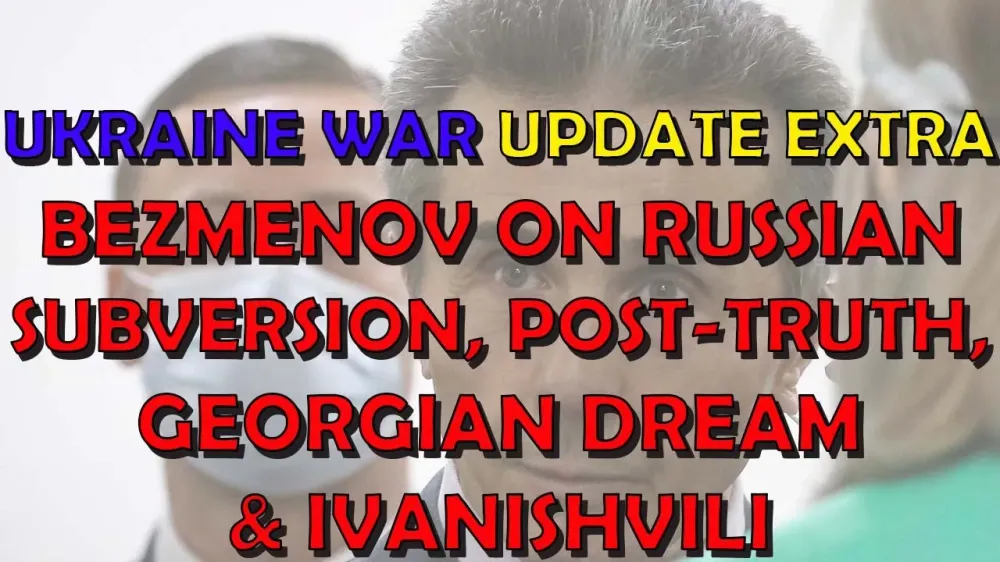Ukraine War Upd. EXTRA: Bezmenov on Subversion, Post-Truth, & Georgian Dream
Table of Contents 📖
| Topic ID | Topic Title | Timestamp |
|---|---|---|
| 1 | Hello Team | 00:00-00:49⏩ |
| 2 | Interview with ex-KGB Yuri Bezmenov (1984) | 00:49-11:09⏩ |
| 3 | Post-truth politics | 11:09-37:15⏩ |
| 4 | Georgian Dream | 37:15-51:23⏩ |
| 5 | Wrap up | 51:23-52:51⏩ |
"The Soviet Union became a society where everyone knew what their leaders said was not real...But the Soviet Union made everyone play along and pretend that it was real because nobody could come up with any alternative."
Hello Team
🎦 00:00-00:49⏩
Jonathan welcomes viewers to an "extra nuggets" Ukraine War update where he is going to share a video of an interview with ex-KGB Yuri Bezmenov from 1984. The interview was recommended by a viewer named Howard - Jonathan thanks him for the reminder. The interview is an hour and 21 minutes long so he's going to share excerpts from a synopsis by Greg.
Return to top⤴️
Interview with ex-KGB Yuri Bezmenov (1984)
🎦 00:49-11:09⏩
Jonathan introduces a video by Greg who is summarising a 1984 interview with ex-KGB Yuri Bezmenov about the four stages of ideological subversion:
- Demoralisation (15-20 years): This involves indoctrinating a nation's youth over generations with an enemy's ideology (e.g. Marxism-Leninism). Greg highlights that this is happening today with platforms like TikTok and Twitter being weaponised by Russia and China.
- Destabilisation (2-5 years): Focus on destabilising a nation's economy, foreign relations, and defence systems. Bezmenov was shocked by how quickly this happened in the US.
- Crisis (up to 6 weeks): Bringing a country to a point of crisis. Central America is cited as an example.
- Normalisation (indefinite): Installing a "big brother" government to restore order.
Jonathan and Greg both draw parallels with the current situation in Ukraine, highlighting Putin's use of language about protecting "brothers" echoing Brezhnev's language during the invasion of Czechoslovakia in 1968. Jonathan remarks that he finds it hard to understand how some people can still support Trump after watching the documentary "Active Measures" which exposed the Trump campaign's links to Russia.
Return to top⤴️
Post-truth politics
🎦 11:09-37:15⏩
Jonathan introduces a video by Pekka Kalayniemi (@VatnikSoup) about post-truth politics based on the work of John Hartley and Adam Curtis. Post-truth politics is defined as a culture where the lines between truth and lies are blurred, with appeals to emotions taking precedence over facts. Jonathan draws parallels with the documentary "Hypernormalisation" by Adam Curtis, which explores the dangers of simplifying complex realities into good vs. evil narratives. Jonathan highlights the weaponisation of social media and the Kremlin's "firehose of falsehood" propaganda approach, which aims to confuse and overwhelm with high volumes of lies and contradictory information. He uses the example of Trump's mastery of marketing and the "mere exposure effect" to highlight how constant exposure to something, whether true or false, can make it seem more credible. Jonathan argues that Twitter's current approach to free speech under Elon Musk creates a fertile ground for this kind of manipulation. He cites the reinstatement of neo-Nazi accounts and the departure of NPR and PBS as evidence of this. The conversation then moves on to the concept of "Vranyo" - a Russian term describing a situation where everyone knows something is a lie but pretends to believe it anyway. This is illustrated with the example of the poisoning of Sergei Skripal. Jonathan expresses his concern about how easily humans can be manipulated, even when presented with irrefutable evidence. He highlights the need to take the "outsider test for faith" and critically examine our own beliefs and biases from an objective standpoint. Jonathan observes that post-truth has been a reality in Russia since the USSR. He cites a quote from Adam Curtis: "The Soviet Union became a society where everyone knew what their leaders said was not real because they could see it with their own eyes...But the Soviet Union made everyone play along and pretend that it was real because nobody could come up with any alternative." Jonathan argues that the situation in Russia hasn't changed, highlighting the Kremlin's use of "Vranyo" to spread disinformation about the war in Ukraine. Jonathan then discusses the concept of "perception management" where authorities selectively present facts to create a desired narrative. Examples given include Reagan's campaign against Gaddafi and Bush's campaign against Saddam Hussein. Jonathan argues that Donald Trump weaponised post-truth politics to a whole new level in the US, citing his constant lying and attempts to overturn the results of the 2020 election. He acknowledges that his views may come across as anti-Trump but argues that this is how Trump is perceived by many people outside of the US.
Return to top⤴️
Georgian Dream
🎦 37:15-51:23⏩
Jonathan discusses the concerning situation in Georgia where the ruling Georgian Dream party, led by billionaire Bidzina Ivanishvili, is using undemocratic tactics to maintain power. He argues that Ivanishvili is terrified of losing the upcoming election and facing a fate similar to Viktor Yanukovych in Ukraine. He then lists and gives examples of the tactics being used by Georgian Dream to undermine democracy in Georgia:
- Controlling the Election Commission (CEC): The ruling party has changed the process for appointing members to the CEC, giving them undue influence over the election process.
- Suppressing Media and Civil Society: Georgian Dream has introduced a "foreign agents" law (similar to the one in Russia) to silence critical voices in the media and NGOs.
- Electoral Manipulation and Voter Suppression: Jonathan highlights a range of tactics including voter intimidation, ballot stuffing, gerrymandering, closing polling stations in opposition strongholds, and scheduling elections on inconvenient dates.
- Disenfranchising Diaspora Voters: Making it difficult for Georgians abroad to vote by limiting polling stations and spreading misinformation. Jonathan highlights this affected the 2020 elections in particular.
- State Media Propaganda: State-run media heavily favour Georgian Dream and spread propaganda to discredit the opposition.
- Intimidating Diaspora Voters: Georgian Dream is accused of intimidating diaspora voters who are critical of the government, including making threats against their families in Georgia.
Jonathan praises the efforts of NGOs and young people to resist these authoritarian tactics and advocate for free and fair elections. He then gives some background information about Bidzina Ivanishvili and his rise to power:
- Ivanishvili made his fortune in Russia in the 1990s, benefiting from his close ties to the government.
- He entered Georgian politics in 2011, founding the Georgian Dream party.
- Ivanishvili initially promised to pursue closer ties with the EU and NATO. However, he has since pivoted towards Russia.
- He stepped down from his official political positions in 2013 but is still considered to be the real power behind the scenes.
- Ivanishvili has been accused of imprisoning and persecuting political opponents (e.g. Mikheil Saakashvili).
- He has also taken control of major media outlets and turned them into pro-government propaganda machines.
- Ivanishvili's government has refused to sanction Russia over the war in Ukraine.
Jonathan expresses concern over the future of Georgia's democracy, arguing that Ivanishvili will likely double down on his authoritarian tactics if he wins the election.
Return to top⤴️
Wrap up
🎦 51:23-52:51⏩
Jonathan concludes by emphasising the importance of being aware of our own susceptibility to manipulation and disinformation. He encourages viewers to regularly challenge their own beliefs and biases and to avoid becoming complacent. He signs off by thanking viewers for listening.
Return to top⤴️



